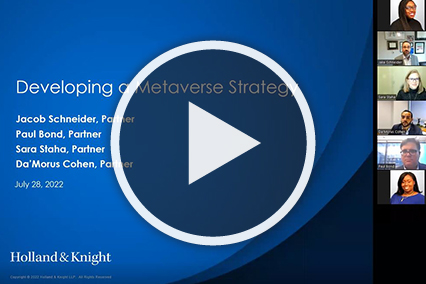Metaverse Strategy
- Holland & Knight's Metaverse Strategy Team helps clients develop innovative legal strategies for virtual worlds.
- Our transactional, intellectual property, regulatory, employment and litigation attorneys provide a 360-degree view of risks and rewards in metaverse adoption.
- We have counseled companies through every previous stage of technological evolution, from online commerce to social media adoption and user-generated content, mobile apps to smart homes, cryptocurrency to non-fungible tokens (NFTs), and we are well positioned to guide them through this nascent, evolving area of law.

Visión General
The metaverse is the new digital frontier, with commercial and industrial applications. As virtual reality (VR) and augmented reality (AR) technologies dramatically improve, companies are investing heavily in immersive experiences for their customers, partners and employees. Virtual worlds serve as offices, points of sale, performance spaces, digital art auction houses, classrooms, training facilities, and even simulated models of factories and industrial equipment. Holland & Knight is at the forefront of advising clients on managing the risks and securing the opportunities of metaverse engagement.
This new and evolving digital arena raises numerous legal issues:
- how to align metaverse engagement with environmental, social and governance (ESG) priorities
- negotiating the purchase of virtual properties
- public policy and regulatory issues surrounding virtual currency and blockchain technology
- conducting metaverse lending (secured and unsecured)
- understanding the role that non-fungible tokens (NFTs) play in virtual spaces, and establishing "rules of the road" for NFT contracts
- implementing labor and employment law protections for companies that conduct business or train in the metaverse
- developing strategies for compliance with applicable advertising, marketing and related consumer protection laws that may impact advertising, marketing and promotional claims made in virtual worlds
- protecting brands, trade secrets, competitive intelligence and other intellectual property in the metaverse
- embedding privacy-by-design in metaverse applications
- understanding and developing governance policies for conduct and commerce in virtual spaces
Litigation/Dispute Risk and Resolution
Sometimes working with an online platform's internal authorities can resolve problems faster than bringing a lawsuit in a brick-and-mortar courthouse. As the metaverse develops, we are already working with clients to resolve their issues in virtual spaces. Our Metaverse Strategy Team also builds on the firm's accomplishments in other parts of the virtual economy.
- Class Actions. We have successfully defended clients against billion-dollar claims regarding collection of personal information, from clickstream data to tracking cookies to biometrics. We are prepared to fight similar data privacy litigation stemming from the metaverse.
- Virtual Service. In a first for the legal industry, in June 2022, a Holland & Knight attorney won approval from a New York judge to serve an anonymous defendant with notice of a $1.3 million asset freeze in a new manner – by embedding a hyperlink into the notice in an NFT sent to the defendant's blockchain address.
- Employment Litigation. Employees are already working in the metaverse. While the workplace is virtual, the need for policies, training and vigorous litigation defense are real. The metaverse raises serious employment issues related to immigration and tax, wage and hour, surveillance and data protection, workplace safety, and employee misconduct and discrimination. Holland & Knight's deep experience litigating these issues in real-world settings has prepared our attorneys for addressing them in virtual worlds as well.
- Education. In the education space, the metaverse is an incredible teaching and learning tool. However, like employment law, anti-discrimination and harassment laws and policies concerning student and faculty conduct must be interpreted for a world where avatars stand in for real-life students.
- Intellectual Property. Companies are building VR worlds and AR experiences that involve strategic partnerships and present unique issues of intellectual property ownership and dispute resolution, and we counsel our clients through all aspects of these issues.
Compliance and Regulatory
- Consumer Protection and Privacy. Our attorneys help players with consumer protection disclosures, biometrics, data breaches, wiretap and privacy laws.
- Consumer Protection and Advertising. Lawyers on our team assist clients with understanding the nuances – legal and practical – with advertising, marketing and promotional claims in a virtual world. This includes understanding the distinct issues that impact advertising in the metaverse, such as three-dimensional claims, the use of influencer avatars and digital influencers, and how to align with the expectations of key regulators relating to disclosure obligations and the dissemination of truthful and nondeceptive promotional communications.
- Tech Transactions. In a space where everything is virtual, ownership of intangible items is critical. Intellectual property law will protect all assets in the metaverse, such as copyrighted content to all manner of trademarks, including logos, brands, slogans and trade dress in the form of packaging and design, and design patent protection for unique configurations. Holland & Knight attorneys will leverage their experience protecting virtual assets, including blockchain, NFT, cryptocurrency and virtual machines, in the metaverse.
Business Law
- Real Estate and Commercial Transactions. Transfers of metaverse space require contracts and due diligence. Our team's experience in real-life transactions, combined with our knowledge of metaverse platforms, enables us to facilitate these deals to improve our clients' real-world positions.
- Banking and Financial Technology (FinTech). Just as in real-world deals, metaverse transactions need payment processing, user authentication and regulatory safeguards. We help structure these processes in real-world deals, including e-commerce, and we can do the same in the metaverse.
- Securities. Major assets are backed by secured finance, which may happen in the metaverse as well. Our lawyers routinely work with the U.S. Securities and Exchange Commission (SEC) and other agencies on their inquiries about our clients' virtual assets.


